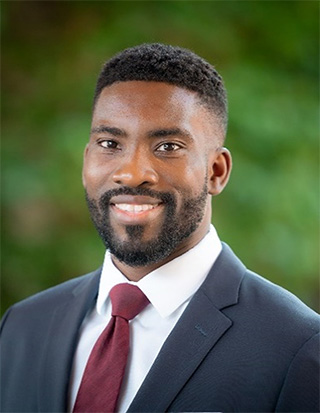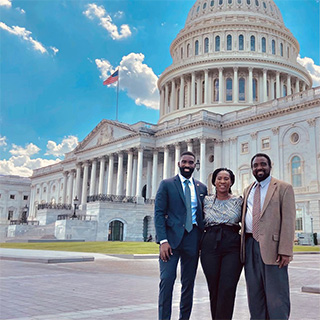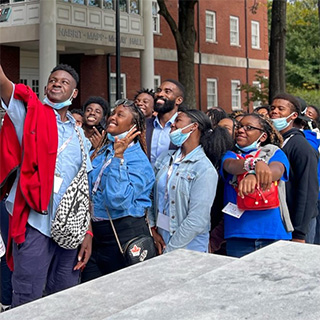
From a very early age, Jamaji Nwanaji-Enwerem, M.D., Ph.D., M.P.P., a former NIEHS-funded postdoctoral fellow, knew he wanted to pursue a career addressing health disparities in the U.S. and abroad. A Nigerian-American, Nwanaji-Enwerem recalls traveling back and forth between the two countries and observing how populations in both nations experience similar health disparities, such as lack of access to healthcare.
“Seeing how health disparities impact people’s lives and their ability to provide for their families sparked my interest in a career that merges both medicine and research,” said Nwanaji-Enwerem, who earned his M.D., Ph.D., and a master’s in public policy from Harvard University. “When I went off to medical school, I was resolute in doing research that was translational in nature, meaning that its findings can have more immediate and lasting contributions, so that fewer people have to experience illnesses related to environmental exposures in the places where they live and work.”
Nwanaji-Enwerem completed his postdoctoral training at the University of California, Berkeley under the guidance of Andres Cardenas, Ph.D. An expert in the field on environmental molecular epidemiology, Nwanaji-Enwerem is now an emergency medicine resident doctor at Emory University’s School of Medicine and an adjunct assistant professor at the School of Public Health.
Predicting Risk of Disease

At the Cardenas lab, Nwanaji-Enwerem’s research aimed to understand how environmental exposures can speed up or slow down biological aging, one of the risk factors for many human diseases, for populations such as children.
“Our chronological age, based on when we were born, and biological age are often not the same. Damage to our cells, from environmental toxins and many lifestyle factors such as diet and sleeping habits, can impact a person’s biological age,” Nwanaji-Enwerem said.

“We hope to use biological aging as a biomarker, or measure, to predict someone’s risk for a disease before they become critically ill,” he continued. “By understanding how exposures impact aging, we can intervene to mitigate adverse aging effects before they lead to illness.”
Community-inspired Projects
At Emory, Nwanaji-Enwerem splits his time between teaching, research, and seeing adult and pediatric patients in the emergency room.
“After people are admitted to the hospital or discharged home, I often find myself reflecting on our interactions. What larger social and environmental factors contributed or exacerbated their disease processes? Are there larger systemic issues related to their problem that still have not been addressed?” he reflected. “These experiences are the inspiration for many of my environmental health research projects and community-based efforts that I pursue in my roles as an adjunct assistant professor and concerned global citizen.”
In 2021, Nwanaji-Enwerem launched ELND, an initiative to help connect, promote, and fund community-level projects. One of their projects, the Vibrations: African Environment Photo Essay Contest provided an opportunity for individuals living in Africa to share their environmental improvement and education efforts and the impacts they are making on their communities.
“The photo essay contest allowed me the privilege of meeting a number of leaders who are making phenomenal impacts in their communities,” Nwanaji-Enwerem said. “Projects included efforts to plant shrubs and trees to fight deforestation, recycling initiatives to manage solid waste, and community residents educating their neighbors about the environmental risks they face every day.”
The contest allowed community leaders to spread awareness about their work and receive funding to continue that work.
“We need as many hands as we can get to solve the problems our world is facing,” Nwanaji-Enwerem shared.
Jamaji Nwanaji-Enwerem


